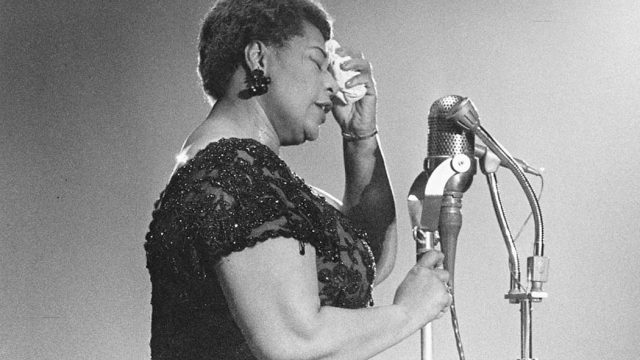Ella Fitzgerald deserves our attention regardless of whether she ever actually appeared in a movie in her life. She was a great performer and a talented songwriter, and she revolutionized the music industry. Especially because she absolutely refused to perform in segregated venues and insisted on being paid the same as white men. (Or her agent did, but you figure he wouldn’t have gotten away with it if she hadn’t wanted that as well.) I mean, that makes her great all by itself. Certainly she wouldn’t even be the first person I’d written about whose connection to film and television is solely musical. You don’t have to, say, appear in a not-very-good-looking movie starring Jack Webb.
Because of the unfortunate lack of streaming options for movies of the era, I can’t actually tell you for sure if she’s good in Pete Kelly’s Blues without renting it. For Ride ‘Em Cowboy and Let No Man Write My Epitaph, you don’t even have that option. Likewise her episode of The White Shadow. You can find St. Louis Blues in its entirety on YouTube, but it’s not officially streaming anywhere. For the most part, the entire acting career of Ella Fitzgerald—not, I grant you, that there’s much of it—has vanished into the inaccessible. No one wants to put obscure stuff up on streaming services unless it’s public domain, it sometimes seems.
You’re much more likely to hear about her friendship with Marilyn Monroe and how Monroe defended her and insisted on her being allowed to perform in clubs that were previously Whites Only. And don’t get me wrong; it’s great of Monroe to have done that. I admire her deeply for having that determination to do what she could to desegregate places. But to focus on Monroe and not what Fitzgerald was doing misses that no one was going to attack Marilyn Monroe. No one was going to lynch Marilyn Monroe.
I would also like to talk about how much she accomplished while simply shy, on top of everything else. She wanted a chance to make a living from singing, and she overcame her own impulses to do it. That’s a lot more admirable than we tend to give people credit for. She didn’t spend much time with the other musicians after gigs, because what she wanted to do was go off and be by herself, presumably where there was no pressure on her. She doesn’t seem to have been unhappy with her chosen life, but it still can’t have been terribly easy for her.
She was a talented woman and a civil rights campaigner. She overcame shyness and bigotry. She did a spot of acting and a ton of performing, and she became one of the most iconic women of the twentieth century. She deserves every bit of attention she gets. Her songs have been in roughly two hundred movies and TV shows—it’s even appeared in video games. Maybe she needed others to stand with her to overcome what she overcame, but she still did it. No wonder Ladies Home Journal declared her one of the hundred most important women of the twentieth century.
Help me rent Pete Kelly’s Blues by supporting my Patreon or Ko-fi!

